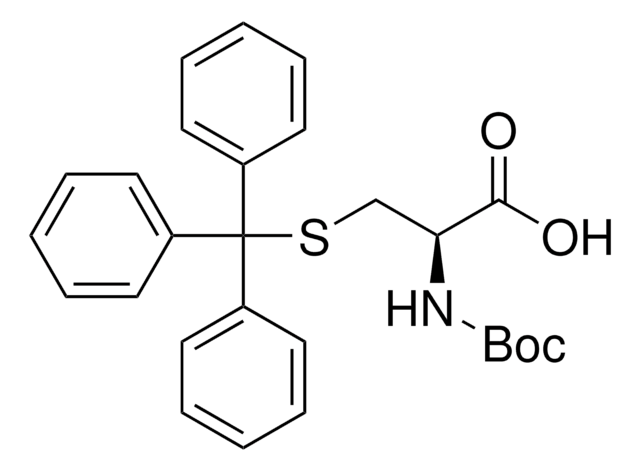P0194
Protein Kinase Cζ isozyme human
≥75% (SDS-PAGE), recombinant, expressed in baculovirus infected insect cells, buffered aqueous solution
Sinonimo/i:
Ca2+-activated phospholipid-dependent serine-threonine kinase ζ isozyme human, PKCζ human
Autenticatiper visualizzare i prezzi riservati alla tua organizzazione & contrattuali
About This Item
Prodotti consigliati
Ricombinante
expressed in baculovirus infected insect cells
Livello qualitativo
Saggio
≥75% (SDS-PAGE)
Stato
buffered aqueous solution
enzyme activity
>800 units/mg protein
PM
76-80 kDa by SDS-PAGE
N° accesso UniProt
Condizioni di spedizione
dry ice
Temperatura di conservazione
−70°C
Informazioni sul gene
human ... PRKCZ(5590)
Azioni biochim/fisiol
PKCζ is a downstream enzyme in insulin signaling pathways.
Protein Kinase C (PKC) is a serine/threonine kinase that is activated intracellularly by signal transduction pathways that produce DAG from phosphatidylinositol diphosphate (PIP2) and phosphatidylcholine (PC) through the action of various activated phospholipases. Phorbol esters also stimulate PKC. At least 11 PKC isozymes have been identified that differ in primary structure, tissue distribution, subcellular localization, response to extracellular signals, and substrate specificity. The isozymes can be grouped into three subfamilies. Members of the first family require Ca2+ and phospholipid and include PKCα, βI, βII, and γ. Members of the second family are phospholipid-dependent but Ca2+-independent, and include PKCδ, ε, η, and θ. Members of the third family are not activated by either DAG or phorbol esters and include PKCξ, μ, and ι.
Phosphorylation appears to be an important mechanism of regulation of all PKCs. PKC plays a role in the regulation of cell transformation, growth, differentiation, ruffling, vesicle trafficking, apoptosis and gene expression.
Phosphorylation appears to be an important mechanism of regulation of all PKCs. PKC plays a role in the regulation of cell transformation, growth, differentiation, ruffling, vesicle trafficking, apoptosis and gene expression.
Compatibilità
PKC ε can transfer 1100 nmole of phosphate to PKC ε substrate peptide per minute per mg of total protein at 30 °C.
Definizione di unità
One unit will transfer 1 nanomole of phosphate to PKC epsilon substrate peptide per minute at pH 7.5 at 30 deg C.
Stato fisico
Solution in 20 mM HEPES, pH 7.5; 2 mM EDTA, 2 mM EGTA, 5 mM DTT, 250 mM NaCl, 0.05% Triton X-100, and 50% glycerol.
Codice della classe di stoccaggio
10 - Combustible liquids
Classe di pericolosità dell'acqua (WGK)
WGK 1
Punto d’infiammabilità (°F)
Not applicable
Punto d’infiammabilità (°C)
Not applicable
Dispositivi di protezione individuale
Eyeshields, Gloves, multi-purpose combination respirator cartridge (US)
Scegli una delle versioni più recenti:
Possiedi già questo prodotto?
I documenti relativi ai prodotti acquistati recentemente sono disponibili nell’Archivio dei documenti.
Hai Huang et al.
Development (Cambridge, England), 138(12), 2477-2485 (2011-05-13)
Post-translational modification by the small ubiquitin-related modifier (SUMO) is important for a variety of cellular and developmental processes. However, the precise mechanism(s) that connects sumoylation to specific developmental signaling pathways remains relatively less clear. Here, we show that Smt3 knockdown
Jun Hou et al.
Journal of thoracic oncology : official publication of the International Association for the Study of Lung Cancer, 7(1), 105-114 (2011-12-03)
A challenge of cancer therapy is to optimize therapeutical options to individual patients. Cancers with similar histology may show dramatically different responses to therapy, indicating that a refined approach needs to be developed to classify tumors by intrinsic characteristics that
Sung Chul Lee et al.
Proceedings of the National Academy of Sciences of the United States of America, 104(40), 15959-15964 (2007-09-28)
Potassium (K(+)) is an essential nutrient for plant growth and development. Plants often adapt to low K(+) conditions by increasing their K(+) uptake capability. Recent studies have led to the identification of a calcium signaling pathway that enables plants to
Yong Xiang et al.
Plant physiology, 144(3), 1416-1428 (2007-05-31)
Plants respond to adverse environments by initiating a series of signaling processes that often involves diverse protein kinases, including calcineurin B-like protein-interacting protein kinases (CIPKs). In this study, putative CIPK genes (OsCIPK01-OsCIPK30) in the rice (Oryza sativa) genome were surveyed
Cecilia D'Angelo et al.
The Plant journal : for cell and molecular biology, 48(6), 857-872 (2006-11-10)
Intracellular release of calcium ions belongs to the earliest events in cellular stress perception. The molecular mechanisms integrating signals from different environmental cues and translating them into an optimized response are largely unknown. We report here the functional characterization of
Il team dei nostri ricercatori vanta grande esperienza in tutte le aree della ricerca quali Life Science, scienza dei materiali, sintesi chimica, cromatografia, discipline analitiche, ecc..
Contatta l'Assistenza Tecnica.






